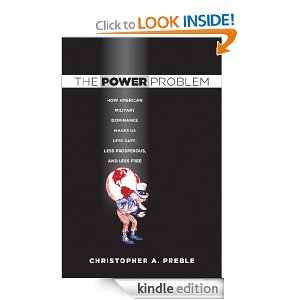What is the best book you can read on the safety and freedom of America? Well right off the bat you know that, despite the howls, it will not be coming out of AEI. If you instead are thinking The Cato Institute, you are right on track. The name of the book is The Power Problem: How American Military Dominance Makes Us Less Safe, Less Prosperous, and Less Free, by my friend Christopher A. Preble, vice president for defense and foreign policy studies at The Cato Institute.
 From inside the dust jacket: “In Preble’s estimate, if the policy makers in Washington have at their disposal immense military might, they will constantly be tempted to overreach, and to redefine ever more broadly the ‘national interest.’ Preble holds that the core national interest—preserving American security—is easily defined and largely immutable. Possessing vast military power in order to further other objectives is, he asserts, illicit and to be resisted. Preble views military power as purely instrumental: If it advances U.S. security, then it is fulfilling its essential role. If it does not—if it undermines our security, imposes unnecessary costs, and forces all Americas to incur additional risks—then our military power is a problem, one that only we can solve. As it stands today, Washington’s eagerness to maintain and use an enormous and expensive military is corrosive to contemporary American democracy.”
From inside the dust jacket: “In Preble’s estimate, if the policy makers in Washington have at their disposal immense military might, they will constantly be tempted to overreach, and to redefine ever more broadly the ‘national interest.’ Preble holds that the core national interest—preserving American security—is easily defined and largely immutable. Possessing vast military power in order to further other objectives is, he asserts, illicit and to be resisted. Preble views military power as purely instrumental: If it advances U.S. security, then it is fulfilling its essential role. If it does not—if it undermines our security, imposes unnecessary costs, and forces all Americas to incur additional risks—then our military power is a problem, one that only we can solve. As it stands today, Washington’s eagerness to maintain and use an enormous and expensive military is corrosive to contemporary American democracy.”
Chris’s book came out in 2009, but today it’s more relevant than ever due to, in some measure, the sequestration flap. Potential cut backs in offense (sorry, defense) always bring out the true colors of politicians, lobbyists, and the scads of policy think tanks and influence peddlers that blanket the American political landscape. As for the media, you just can’t get a good shake. I rate the big three networks, as well as Fox, CNN and the hysterical MSNBC (do Americans really watch this stuff?) as counterproductive to the interests of Americans who believe in the constitutionally strong federal republic form of government envisioned by our Founders.
Chris discusses fulfilling an essential role while not undermining our security and not imposing unnecessary costs and risks. In this regard, let’s look at the Weinberger/Powell Doctrine, which Chris deals with in his book. I would like you to read the article Weinberger/Powell Doctrine R.I.P., penned by Chris in 2011, in which he writes, “Actually, it isn’t a question. It’s a statement: the doctrine that sought to prevent the United States from engaging in risky and counterproductive missions that had nothing to do with protecting U.S. vital interests (e.g., Lebanon, 1983; Somalia, 1991; and Kosovo, 1999) is dead. Shovel dirt on it “
Chris explains that the doctrine’s essential elements boil down to five key questions. (1) Is there a compelling national interest at stake? (2) Have the costs and consequences of intervention been considered? (3) Have we exhausted all available options for resolving the problem, i.e. is force a last resort? (4) Is there a clear and achievable military mission, and therefore a well-defined end state? (5) Is there strong public support-both domestic and international support-for the operation?
The Libyan foray is exhibit number one. Chris quickly concludes, in short, that there was no compelling U.S. national interest at stake. The costs and consequences were not considered or debated, the mission was not clearly defined, and we did not have a clear understanding of an end state. ”It goes too far to claim that the Libyan intervention killed the Weinberger/Powell doctrine. It was already dead, or at least very sick. But I (Chris) see President Obama’s decision as a clear indication that the relative wisdom and prudence of the Reagan/Bush I years is but a distant memory.”
In May 2009, Chris authored a series of articles appearing in The Globalist. Among the conclusions outlined (each from The Power Problem) are the following: “(1) For too long, we have defined our strength as a nation by our capacity for waging war. (2) We have come to believe, erroneously, that military power keeps us safe, and that more power will keep us safer. (3) But the true strength of the United States, the true source of U.S. power, is its people. Our spirit, our generosity and our ingenuity are expressed in countless ways, most of which have nothing to do with our military prowess. (4) By reducing the size of our military to a level more consistent with our own needs, and by encouraging others to become more reliant, we can make space for the other forms of human interaction that facilitate security and prosperity over the long haul.”
Next Monday at richardcyoung.com, I will conclude my three part series on Cato Institute’s Chris Preble and The Power Problem. I will also include a review of Chris’s “Was Counterinsurgency Worth It?” Finally, I’ll give you some of the highlights of Chris’s recent look at “Costs and Benefits of 2013’s Foreign Policy Initiatives.” You’ll not want to miss this pivotal posting on the security of America.
In preparation for part two of The Power Problem, Chris emailed me a few thoughts that I want to share with you here. You can expand on each in The Power Problem. Chris writes, “Powell (Colin) isn’t perfect, not by a long stretch, but I think his instincts when it comes to using the military are spot on. And the fact that he was opposed so strenuously by a liberal Democrat and the neocons tells you a lot about both groups—they are the same! Look at what Paul Wolfowitz said about Albright, or what Bill Kristol said about Susan Rice. These people aren’t partisans the way they are portrayed. They care more about being involved all over the world than they do about electing Republicans. Which is why they have been a disaster for the GOP. Why can’t the party figure this out? Anyway, there are two parties: the evil party, and the stupid party. And they’re both wrong on foreign policy.”
What we are looking at here is the appropriate defense (as opposed to offense) policy to make America safer, more prosperous, and more free for us all. I know of no better organization than the Cato Institute to bring the safety and freedom message to all Americans. And as you can see, I view Chris Preble to be a Cato standard-bearer.
Read Part I and Part III of The Most Important Person in America You May Never Have Heard Of
If you’re willing to fight for Main Street America, click here to sign up for my free weekly email.






